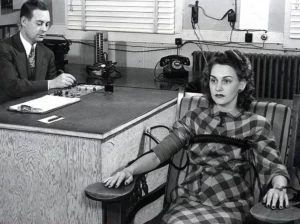The use of polygraph testing (in Australia) in criminal investigations began in the early 20th century. Polygraphs measure physiological responses such as heart rate and blood pressure, and are seen as a tool for determining the truthfulness of suspects and witnesses.
One of the earliest documented cases dates back to 1912, when a police officer in New South Wales administered it to a suspect in a murder investigation. However it wasn’t until the 1950s that they began to be used more widely in criminal investigations.

Around that time, the Australian Federal Police started using them, with a focus on cases involving national security. In the 1960s, the police used it on employees of the Australian Security Intelligence Organization (ASIO) in order to screen for potential safety risks.
At the same time, there were concerns among legal professionals about their reliability as well as the legal implications of using them as evidence in court. In 1963, a judge in the Victorian Supreme Court refused to accept polygraph evidence, saying that “the validity of the polygraph as a way to determine guilt or innocence is by no means beyond question.”
Despite these, they continued to be used in criminal investigations throughout the latter half of the 20th century. There was no consistent approach, with different police forces and courts taking varying positions on the admissibility and credibility of their evidence.
While they’ve been used in Australia for almost a century, their application still remains inconsistent.
The current use

One of the most common uses is for employment screening, particularly in government and law enforcement roles. Some agencies require it as part of their background check, with the aim of identifying any potential dishonest behavior.
Another use is in the investigation of specific crimes. However, it is generally more limited than in the past, and there is no consistent approach across different police forces or jurisdictions.
In some cases, polygraph evidence has been admitted in the context of plea bargaining, where a defendant agrees to take it in exchange for a more lenient sentence. But even in these cases, the legality is generally at the discretion of the judge.
Legal framework
Currently, there is no national legislation in Australia that specifically regulates the use of polygraphs. Instead, the acceptance of evidence is determined on a case-by-case basis, with judges making decisions based on a range of factors, including the validity of the results and their relevance to the case.
In recent years, there have been calls for greater regulation, with some experts arguing that specific laws are needed to ensure that they are administered and interpreted in a consistent and reliable manner. However there is no consensus on the best way to regulate them, and the debate continues to be complex.
Current debate

While their use has been banned in some states, others still allow them as part of criminal investigations.
One of the main concerns is their accuracy. Those in favor argue that they are an effective tool for detecting deception; those opposed argue that they are not foolproof and can produce both false positives and false negatives. Their accuracy is particularly questioned when it comes to innocent people who may be falsely accused of a crime.
Another concern is their potential to be used as a coercive tool. Some claim that polygraphs can be intimidating, particularly for vulnerable individuals such as those with mental health issues or intellectual disabilities. And therefore be seen as an abuse of power by law enforcement and a violation of the rights of the accused.
There is also the question of the scientific basis. Some say that the scientific validity of the techniques has not been sufficiently established and that they are not supported by adequate empirical evidence. This has led to calls to ban it outright in Australia.
There have been some efforts to regulate their use in criminal investigations. In 2015, the New South Wales Parliament passed the Forensic Procedures Amendment (Polygraph Testing) Act. Under the act, polygraphs can only be used with the consent of the person being tested, and the results cannot be used as evidence in court.
Various regulations governing the admissibility of polygraphs in court in different Australian states
Laws differ across different Australian states. In New South Wales and Victoria, results are generally not admissible as evidence, while in Queensland, they are only admissible if all parties involved agree to them beforehand.
In South Australia, the Evidence Act 1929 allows for the outcomes to be admitted in criminal proceedings, but only if certain conditions are met. For instance, the subject must have given consent, the examiner must have been qualified, and the prosecution and defense must agree to the admission of the evidence.
In Western Australia, the Evidence Act 1906 does not specifically address the admissibility of polygraph evidence, but the general rule is that it must be relevant, reliable, and fair to be allowable.
In Tasmania and the Northern Territory, there are no specific laws. That said, the general rule still applies.
Even if polygraph evidence is allowed in court, it is still subject to challenge and cross-examination. The court will weigh it against other factors in the case before making a decision.
Procedural guidelines

One of the key considerations is informed consent. Before a test can be administered, you must be fully aware of the nature of the test and the potential implications of the results. This includes your right to refuse without any negative consequences.
Another important factor is confidentiality. The results are considered highly sensitive and should be treated as such. Only authorized individuals should have access to them, and they should only be used for the specific purpose for which they were obtained.
In addition to these, there are numerous operational guidelines that govern the use of polygraphs in Australia.
Impact on the admissibility of polygraph evidence
Procedural guidelines play a major part and been established by multiple organizations, including the Australian Polygraph Association, the Australian Psychological Society, and the Australian and New Zealand Society of Criminology. The courts highly consider them when determining whether to admit polygraph evidence.
A recap
Throughout this article, we explored the role of polygraphs in Australia, the current debate and controversies surrounding their admissibility, recent developments in policy and legal guidelines, specific laws in different Australian states, and the impact of these guidelines on the admissibility of polygraph evidence in court.
The impact of evidence on court proceedings remains limited. The vast majority of jurisdictions do not consider polygraphs to be trustworthy or valid enough, and courts are unlikely to accept findings without additional supporting evidence.

